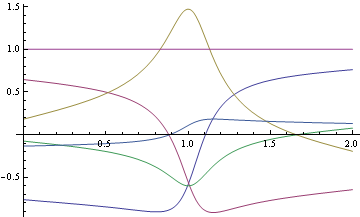I have a set of differential equations (or DAEs): $\begin{cases} 5x_{2} + 3x_{4} + 3x_{5} = \frac{dx_{1}}{dt}\\ 5x_{1} + 5x_{2} + 5x_{3} + 3x_{4} + x_{5}= 0\\ 3x_{2} + 3x_{4} + 10x_{5} = \frac{dx_{3}}{dt}\\x_{1} + 3_{2} + 2x_{3} + 3x_{4} + 10x_{5} = 0\\ x_{1} + 2x_{2} + 3x_{3} + 4x_{4} + 5x_{5} = \frac{dx_{5}}{dt}\end{cases}$
I hope to impose the normalization condition that $|x_{1}|^2+|x_{2}|^2+|x_{4}|^2$=1 for all time. This is, however, not an initial condition.
Can someone help me? Thank you very much.
When I try to add the normalization condition as part of the DAEs equations, the error is:
Solve::inex: Solve was unable to solve the system with inexact coefficients or the system obtained by direct rationalization of inexact numbers present in the system. Since many of the methods used by Solve require exact input, providing Solve with an exact version of the system may help. >> DSolve::bvfail: For some branches of the general solution, unable to solve the conditions. >>
(Note: The above set of differential equations is just arbitrary, may not be consistent or solvable.)


x1etc. Thanks. $\endgroup$